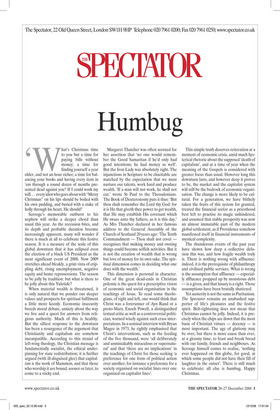Humbug
‘What’s Christmas time to you but a time for paying bills without money; a time for finding yourself a year older, and not an hour richer; a time for balancing your books and having every item in ’em through a round dozen of months presented dead against you? If I could work my will... every idiot who goes about with “Merry Christmas” on his lips should be boiled with his own pudding, and buried with a stake of holly through his heart. He should!’ Scrooge’s memorable outburst to his nephew will strike a deeper chord than usual this year. As the recession bites, and its depth and probable duration become increasingly apparent, many will wonder if there is much at all to celebrate this festive season. It is a measure of the scale of this global downturn that it has eclipsed even the election of a black US President as the most significant event of 2008. Now 2009 stretches ahead bleakly, a grim vista of crippling debt, rising unemployment, negative equity and home repossessions. The season to be jolly by tradition: but what is there to be jolly about this Yuletide?
When material wealth is threatened, it is only natural that we ponder our deeper values and prospects for spiritual fulfilment a little more keenly. Economic insecurity breeds moral debate, anxiety about the way we live and a quest for answers from religious authority. Much of this is healthy. But the silliest response to the downturn has been a resurgence of the argument that Christianity and capitalism are somehow incompatible. According to this strand of left-wing theology, the Christian message is fundamentally socialist, the ethical underpinning for state redistribution; it is further argued (with ill-disguised glee) that capitalism is the work of Mammon, and that those who worship it are bound, sooner or later, to come to a sticky end. Margaret Thatcher was often scorned for her assertion that ‘no one would remember the Good Samaritan if he’d only had good intentions; he had money as well’. But the Iron Lady was absolutely right. The injunctions in Scripture to be charitable are matched by the expectation that we must nurture our talents, work hard and produce wealth. ‘If a man will not work, he shall not eat,’ wrote St Paul to the Thessalonians. The Book of Deuteronomy puts it thus: ‘But thou shalt remember the Lord thy God: for it is He that giveth thee power to get wealth, that He may establish His covenant which He sware unto thy fathers, as it is this day.’ As Mrs Thatcher declared in her famous address to the General Assembly of the Church of Scotland 20 years ago: ‘The Tenth Commandment — Thou shalt not covet — recognises that making money and owning things could become selfish activities. But it is not the creation of wealth that is wrong but love of money for its own sake. The spiritual dimension comes in deciding what one does with the wealth.’ This dimension is personal in character. One of the great dead-ends in Christian polemic is the quest for a prescriptive vision of economic and social organisation in the teachings of Jesus. To read some theologians, of right and left, one would think that Christ was a forerunner of Ayn Rand or a proto-Marx. Enoch Powell, a distinguished textual critic as well as a controversial politician, warned wisely against such crass interpretations. In a seminal interview with Bryan Magee in 1973, he rightly emphasised that Christ’s interventions, such as the feeding of the five thousand, were ‘all deliberately and unmistakably miraculous or supernatural’ and that ‘there are no implications’ in the teachings of Christ for those seeking ‘a preference for one form of political action over another, for instance a preference for a society organised on socialist lines over one organised on capitalist lines’. This simple truth deserves reiteration at a moment of economic crisis, amid much hysterical rhetoric about the supposed ‘death of capitalism’, and at a time of year when the meaning of the Gospels is considered with greater focus than usual. However long this downturn lasts, and however deep it proves to be, the market and the capitalist system will still be the bedrock of economic organisation. The change is more likely to be cultural. For a generation, we have blithely taken the fruits of this system for granted, treated the financial sector as a priesthood best left to practise its magic unhindered, and assumed that stable prosperity was now an almost immutable part of the modern global settlement, as if Providence somehow manifested itself in financial instruments of mystical complexity.
The thunderous events of the past year have shown how deep a collective delusion this was, and how fragile wealth truly is. There is nothing wrong with affluence: indeed, it is the prerequisite of philanthropy and civilised public services. What is wrong is the assumption that affluence — especially affluence propped up by monstrous debt — is a given, and that luxury is a right. Those assumptions have been brutally shattered.
Yet austerity is not the same as Puritanism. The Spectator remains an unabashed supporter of life’s pleasures and the festive spirit. Belt-tightening does not mean that Christmas cannot be jolly. Indeed, it is precisely when the chips are down that the most basic of Christian virtues — decency — is most important. The age of gluttony may be over, but there is more cause than ever, at a gloomy time, to feast and break bread with our family, friends and neighbours. As Scrooge himself comes to realise, ‘nothing ever happened on this globe, for good, at which some people did not have their fill of laughter in the outset’. There is still much to celebrate: all else is humbug. Happy Christmas.






















































































































 Previous page
Previous page